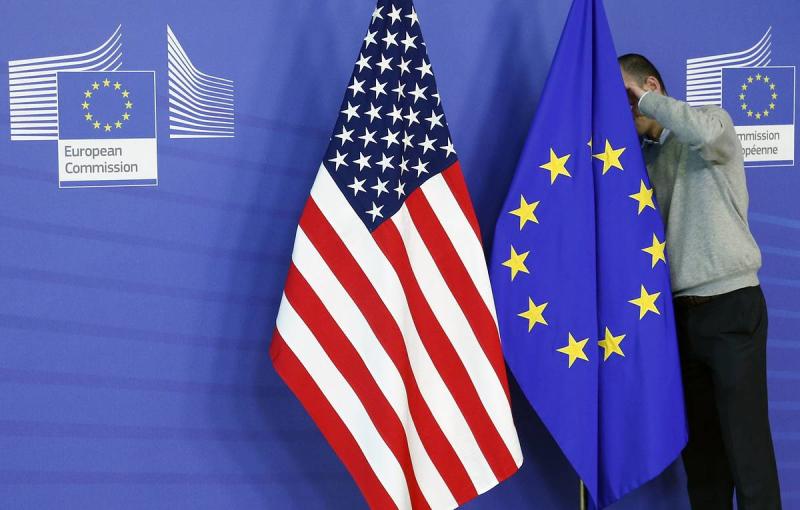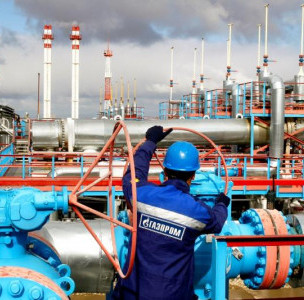
© REUTERS/Francois Lenoir/TASS
Senior European politicians are getting increasingly annoyed by the White House, which profits both from the Ukrainian crisis and European problems, Politico reports quoting its sources. They consider Biden's environmental subsidies and tax relief as major sources of tension unfairly restricting trade and threatening to destroy the continent's industry.
This refers to a package of disinflation initiatives approved by the American Congress in August 2022. According to Maxim Darmeh, an economist with Allianz Trade, the United States plans to spend some $430 billion from the state budget for these purposes. It is part of a large investment plan to combat climate change, which provides for large-scale tax and other benefits and incentives, though solely for enterprises registered within American jurisdiction. For instance, they provide a tax discount of 7.5 thousand dollars for the purchase of an electric car in case it is assembled in the country’s territory, with its batteries containing at least 40% of home-produced minerals.
By accepting the mentioned package, the Biden administration actually proceeded with Donald Trump's "Make America Great Again" strategy. What’s peculiar about the current administration's approach is that it does not use tariff tools, as it was during the Trump era, but tax-preferential ones. Its goal is to stimulate the transfer of industrial enterprises to the United States and protect the domestic market. For this very reason Elvire Fabry, an expert on trade geopolitics at the Delors Institute, regards it as "irrepressible protectionism". But this disinflationary policy trend of America has aggravated relations with its traditional allies as represented by Europe, South Korea and Japan.
According to a number of European experts, this will entail lower competitiveness of European enterprises in the American market and investment flows from the EU to the United States.
Concern about this plan’s consequences is particularly high in Germany and France. "The real European risk is technological, industrial and economic lag, which unleashes the hands of the United States and China," French Economy Minister Bruno Le Maire stated. According to France’s Le Figaro, the US anti-inflationary scheme runs counter to the WTO-established rules.
As a result, the United States and Europe face a trade war due to Washington's refusal to let European manufacturers engage in the program, the German Spiegel writes.
With some delay, EC officials have also begun to realize this. According to its Executive Vice President Valdis Dombrovskis, the US law on reducing inflation contains discriminatory elements that can harm European companies and their export opportunities to the US, as well as the ability to fairly compete with US products in third-country markets. He voiced this opinion ahead of the third EU-US Trade and Technology Council. "We demand fairness, nothing more: we want and expect European companies and exports to be treated in the United States in the same way that American companies and exports are treated in Europe… The recognized rules of international trade must be observed in this process, and we will be rigid in the issue," Dombrovskis added.
He is echoed by Commissioner for the Internal Market Thierry Breton: "In August, I was sounding the alarms," he said on BFMTV the other day. "The United States’ giant subsidies have nothing to do with what we allow in Europe; it creates a real skew in competition." Thierry Breton does not even rule out proceedings in the WTO. "We will have to address the WTO and consider retaliatory measures," he said, expressing readiness to go the whole hog.
Now the EU is searching for a counterweight to Biden's disinflation plan. In words and on paper, officials and experts are unanimous: Washington violates multilateral rules. But European officials are not ready for a real confrontation with their "overseas friend." At the moment, Brussels has chosen a diplomatic path and will create a "working group" along with Washington to deal with the challenge.
The approach is "atypical," to put it mildly, says Professor Sebastien Jean of the CNAM University in Paris. "In other circumstances, the EU would have already filed a complaint with the WTO. But the WTO has lost ground due to what is happening in Ukraine… Appealing to Geneva is useless now, because the appellate dispute settlement authority is still paralyzed because of the US stance."
Washington, despite verbal objections from Europe, has so far shown no signs of effecting real compromise, and appeases the EU. As their source told Politico, EU leaders discussed the impact of American policy on European markets with US President Joe Biden. But the talks turned futile ˗ as it turned out, "Biden simply did not know about its consequences for the European Union." This "American ignorance" has become a major problem.
Meanwhile, amid these negotiations, a growing number of European enterprises hesitate between European and American platforms, knowing that US subsidies are four to ten times higher as compared to what the EC allows. According to the French Economy Ministry, tens of billions of investment euros and thousands of industrial jobs are at stake.
European experts believe there is only one thing able to help in this situation – new strategic alliances and partnerships.
But where can one find them? Relations with Russia have been destroyed, along with the relevant competitive advantages like cheap energy resources or raw materials European competitiveness relies upon, as it turned out.









